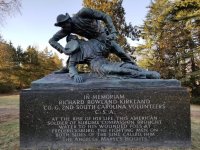From the Camden Confederate, April 25, 1862
https://chroniclingamerica.loc.gov/lccn/sn85042595/1862-04-25/ed-1/seq-1/#
The Northern Papers say that among the prizes captured by the Federal Soldiers at Fort Donelson, was a rifle said to be worth one thousand dollars. Its breech is said to be inlaid with the finest gold. It belonged to a hotel keeper in Memphis, and was won by him at a horse race.
https://chroniclingamerica.loc.gov/lccn/sn85042595/1862-04-25/ed-1/seq-1/#

